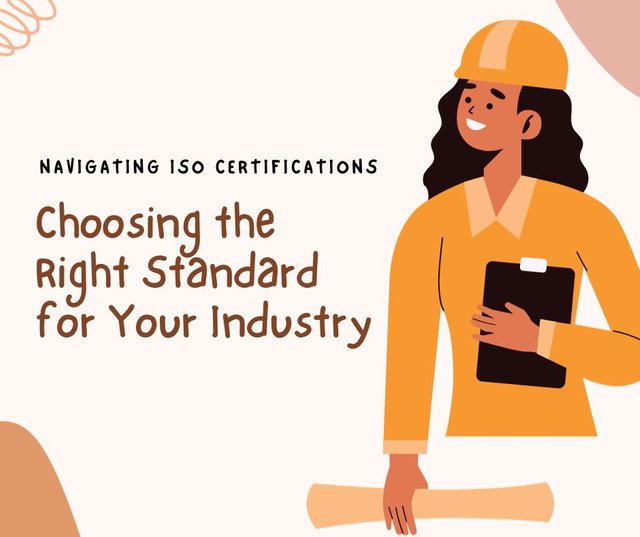Navigating ISO Certifications: Choosing the Right Standard for Your Industry

ISO certifications serve as beacons of excellence, providing businesses with globally recognized benchmarks for quality, safety, and environmental management. With a plethora of standards available, selecting the right one for your industry can be a strategic decision with far-reaching implications. In this article, we will delve into various types of ISO certifications and offer guidance on how businesses can make informed choices.
Types of ISO Certifications
ISO 9001: Quality Management System (QMS)
ISO 9001 focuses on enhancing customer satisfaction by ensuring that products and services consistently meet customer requirements. It emphasizes process improvement, risk management, and customer-centricity. This standard is versatile and applicable across industries, making it one of the most widely adopted ISO certifications.
ISO 14001: Environmental Management System (EMS)
ISO 14001 is dedicated to minimizing environmental impact and promoting sustainable practices. It guides organizations in managing resources, reducing waste, and ensuring compliance with environmental regulations. This certification is crucial for businesses looking to demonstrate their commitment to eco-conscious operations.
ISO 45001: Occupational Health and Safety Management System (OH&SMS)
ISO 45001 sets the framework for establishing safe and healthy workplaces. It emphasizes hazard identification, risk assessment, and continuous improvement of occupational health and safety. This certification is essential for industries where workplace safety is paramount, such as manufacturing, construction, and healthcare.
ISO 27001: Information Security Management System (ISMS)
ISO 27001 addresses the protection of sensitive information and data. It outlines measures for managing risks related to information security, including data confidentiality, integrity, and availability. This certification is critical for businesses handling sensitive data, including those in finance, healthcare, and IT sectors.
ISO 22000: Food Safety Management System (FSMS)
ISO 22000 is tailored for organizations in the food industry. It ensures the safety and quality of food products by establishing comprehensive food safety management systems. This certification is indispensable for food manufacturers, processors, and distributors.
ISO 50001: Energy Management System (EnMS)
ISO 50001 is designed to help businesses improve energy efficiency and reduce energy-related costs and environmental impact. It provides a structured framework for establishing energy management systems, making it vital for industries with high energy consumption, such as manufacturing and utilities.
Choosing the Right ISO Certification for Your Industry
Identify Industry-Specific Needs
Consider the unique challenges and requirements of your industry. For example, a manufacturing company might prioritize ISO 9001 for quality assurance, while a healthcare facility may lean towards ISO 45001 for ensuring staff safety.
Regulatory Compliance
Evaluate industry-specific regulations and legal requirements. Certain sectors, like healthcare and finance, may have strict compliance standards, necessitating certifications such as ISO 27001 for information security.
Customer and Stakeholder Expectations
Understand the expectations of your customers and stakeholders. Many large corporations and government agencies require suppliers to hold specific ISO certifications. Meeting these expectations can open doors to lucrative contracts and partnerships.
Risk Assessment
Conduct a thorough risk assessment to identify areas where an ISO certification can mitigate potential risks. This could be related to quality control, environmental impact, data security, or workplace safety.
Resource Allocation
Consider the resources, both human and financial, required for implementing and maintaining an ISO certification. Evaluate if your organization has the capacity to commit to the certification process effectively.
Conclusion
Selecting the right ISO Certification for your industry is a strategic decision that can significantly enhance your business operations and reputation. By understanding industry-specific needs, regulatory requirements, and stakeholder expectations, businesses can make informed choices that lead to improved quality, safety, and sustainability. Investing in the right ISO certification is not just a mark of excellence; it is a powerful tool for achieving long-term success in today's competitive market.